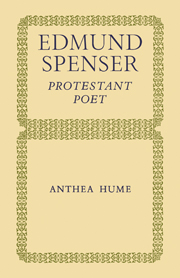Summary
In A Theatre for voluptuous Worldlings the young Spenser translated the French of Marot, itself a version of the Italian of Petrarch, with an enjoyment which is obvious despite the rhythmic stiffness of inexperience:
Then heauenly branches did I see arise,
Out of a fresh and lusty Laurell tree
Amidde the yong grene wood. Of Paradise
Some noble plant I thought my selfe to see,
Suche store of birdes therein yshrouded were,
Chaunting in shade their sundry melodie.
But elsewhere in the Theatre, following his Flemish model, he sounded with equal conviction the note of Protestant fervour:
I saw a Woman sitting on a beast
Before mine eyes, of Orenge colour hew;
Horrour and dreadfull name of blasphemie
Filde hir with pride.
Spenser was only sixteen or seventeen when he made these verse translations for Jan van der Noodt, but in a number of ways they anticipate his preoccupations of later years. Throughout his writing life the poet continued to reveal in his work both an enthusiasm for the humanist inheritance and a zealous, even militant Protestantism. His knowledge of the literature of antiquity and of Renaissance Italy and France has received sympathetic critical study during our own century - his debts to Virgil and Ovid, to Petrarch, Ariosto and Tasso, to Marot and du Bellay, to Renaissance Neoplatonism, mythography and iconography, have been admirably scrutinised – but the impact of his Protestantism on his imaginative writing has been treated with more reserve.
- Type
- Chapter
- Information
- Edmund SpenserProtestant Poet, pp. 1 - 10Publisher: Cambridge University PressPrint publication year: 1984



